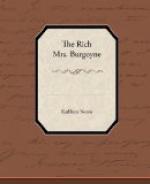The new mistress of the Hall, in her vigorous young interest in all things, included naturally a keen enjoyment of the village love affairs, she liked to hear the histories of the old families all about, she wanted to know the occupants of every shabby old surrey that drew up at the post-office while the mail was being “sorted.” But if the conversation turned to mere idle talk and speculation, she was conspicuously silent. And upon an occasion when Mrs. Adams casually referred to a favorite little piece of scandal, Mrs. Burgoyne gave the conversation a sudden twist that, as Mrs. White, who was present, said later, “made you afraid to call your soul your own.”
“Do you tell me that that pretty little Thorne girl is actually meeting this young man, whoever he is, while her mother thinks she is taking a music lesson?” demanded Mrs. Burgoyne, suddenly entering into the conversation. “There’s nothing against him, I suppose? She could see him at home.”
“Oh, no, he’s a nice enough little fellow,” Mrs. White said, “but she’s a silly little thing, and I imagine her people are very severe with her; she never goes to dances or seems to have any fun.”
“I wonder if we couldn’t go see the mother, and hint that there is beginning to be a little talk about Katherine,” mused Mrs. Burgoyne. “Don’t you think so, Mrs. Adams?”
“Oh, my goodness!” Mrs. Adams said nervously, “I don’t know anything about it! I wouldn’t for the world—I never dreamed—one would hate to start trouble—Mr. Adams is very fond of the Thornes—”
“But we ought to save her if we can, we married women who know how mischievous that sort of thing is,” Mrs. Burgoyne urged.
“Why, probably they’ve not met but once or twice!” Mrs. White said, annoyed, but with a comfortable air of closing the subject, and no more was said at the time. But both she and Mrs. Adams were a little uneasy two or three days later, when, returning from a motor trip, they saw Mrs. Burgoyne standing at the Thornes’ gate, in laughing conversation with pretty little Katherine and her angular, tall mother.
“And there is nothing in that story at all,” said Mrs. Burgoyne later, to Mrs. Carew.
“I suppose you walked up and said, ’If you are Miss Thorne, you are clandestinely meeting Joe Turner down by the old mill every week!’” laughed Mrs. Carew,
“I managed it very nicely,” Mrs. Burgoyne said, “I admired their yellow rose one day, as I passed the gate. Mrs. Thorne was standing there, and I asked if it wasn’t a Banksia. Then the little girl came out of the house, and she happened to know who I am—”
“Astonishingly bright child!” said Mrs. Carew.
“Well, and then we talked roses, and the father came home—a nice old man. And I asked him if he’d lend me Miss Thorne now and then to play duets—and he agreed. So the child’s been up to the Hall once or twice, and she’s a nice little thing. She doesn’t care tuppence for the Turner boy, but he’s musical, and she’s quite music-mad, and now and then they ‘accidentally’ meet. Her father won’t let anyone see her at the house. She wants to study abroad, but they can’t afford it, I imagine, so I’ve written to see if I can interest a friend of mine in Berlin—But why do you smile?” she broke off to ask innocently.




